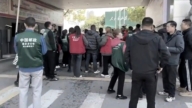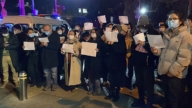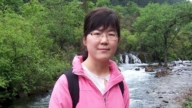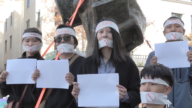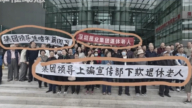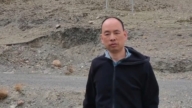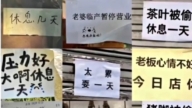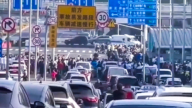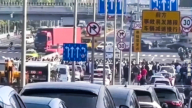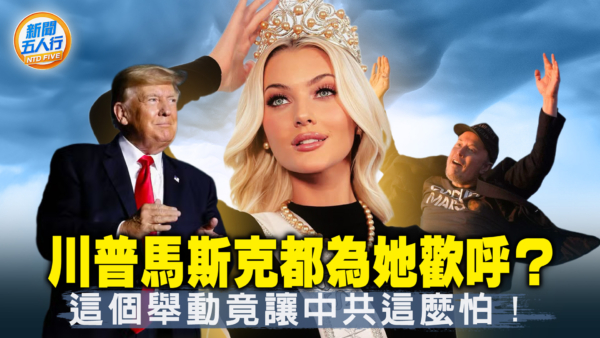【新唐人2014年11月12日讯】美国总统欧巴马11月10号抵达北京,展开3天的访问。相较于第一天的大礼,宣布延长中国人赴美签证最长有效期,外界更关注的是,欧巴马重申会继续关注中国人权问题,并说香港占中最重要的讯息,是确保避免暴力发生。他强调,美国不会在人权和香港问题上保持缄默。
美国总统欧巴马在APEC峰会上演讲了将近20分钟,从开场的延长中国人赴美签证到中美合作,也强调美国将继续关注中国的人权、新闻自由等问题,并关注中国市场开放、创造公平营商环境等问题。
欧巴马还希望美中在双边投资协议以及减少贸易壁垒上有所进展,并敦促中共当局杜绝网络盗窃商业利益的行为。
美国总统欧巴马:“我们期待中国创造一个更公平的竞争环境给外国公司,使他们能与中国企业进行更公平的竞争。……我们期待中国成为一个创新的经济体,重视知识产权的保护,并杜绝网络盗窃商业秘密,谋取商业利益。”
针对目前香港争普选的占中行动,欧巴马表示,最优先考虑的是确保避免暴力事件发生。他还说,美方不能漠视中国人权及香港问题。
美国总统欧巴马:“要捍卫人权和新闻自由,我们提出这项提议不是因为对自己有利,而是为了中国的持续发展以及亚太地区的安定。”
在欧巴马出访中国之前,美国参议院外交委员会两名重量级议员呼吁欧巴马向习近平提出中国人权问题。参议院外交委员会亚太小组委员会共和党资深议员马克•鲁比克和该委员会主席本•卡丁致函欧巴马总统,对中国政府以人权和法治为代价的专制控制表达关注。
时事评论员伍凡:“共和党是对中共政权相当不满意,所以欧巴马这次临来北京之前,共和党的两位参议院的参议员写信给欧巴马,要他提人权问题、新闻自由问题,包括香港问题,尽管预料的到,习近平不会按照美国方式来做,但欧巴马非讲不可。”
针对中国人权问题,欧巴马说:我们不期待中国学习美国模式,但是我们会继续关注中国的人权问题。
北京维权人士胡佳:“我特别希望,不仅仅是欧巴马先生,就是说他(欧巴马)现在不是提到人权吗?那他应该知道,就是因为这个会议本身造成的限制人权问题,对一个中国普通公民产生莫大的影响。”
因为APEC而被软禁45天的胡佳举例,欧巴马、习近平和自己都有女儿,欧巴马、习近平都可以自由的和女儿在一起,而自己仅仅因为声援香港,就被软禁而无法与女儿相聚,胡佳说,这是中国最现实的一个对比。
北京维权人士胡佳:“我在北京,北京市民抱怨的最多情况,天津市民主要是供暖的问题,说供暖会影响空气质量,那么昨天晚上我们看到了APEC那边放了很多的烟花,他们说是环保烟花也罢什么烟花也罢,只是你不能只许州官放火不许百姓点灯啊。”
中共当局为了保证APEC会议的顺利召开,加强对访民的稳控,不允许他们靠近APEC会场。更有访民收到地方信访局的电话,以金钱利诱他们不要在APEC期间赴京上访。
胡佳表示,中共政权不断变换手法来践踏人权。比如自己就不再被以“煽动颠覆国家政权罪”的罪名打压,而是变成所谓的“寻衅滋事罪”。胡佳还说,最近不到两年的时间内,北京被抓的人数,甚至超过上一届中共领导班子执政十年的总和。
采访/朱智善 编辑/黄亿美 后制/郭敬
Obama Urges China to Uphold Human Rights in APEC
U.S. President Barack Obama arrived in Beijing on Nov. 10
for his three-day visit to China.
He announced the longest validity visa policy with China,
and reiterated the concern about China ‘s human rights issues.
Obama also expressed that the most critical issue regarding
Hong Kong’s Occupy Central is avoiding violence.
He stressed, the United States would not remain silent
on the human rights issues and HK’s pro-democracy protests.
Obama’s speech at the APEC summit
lasted nearly 20 minutes.
He began with the visa extension for Chinese people
and the cooperation between the U.S. and China.
He also stressed that the U.S. would continue to concern
about China’s human rights, press freedom and other issues,
including China’s market access
and creation of a fair business environment, etc.
Obama hoped that issues regarding the bilateral investment
agreement and the elimination of trade barriers.
He also urged the Chinese authorities to reject
the use of cyber theft for commercial gain
Obama: “We look to China to create a more level playing
field on which foreign companies are treated fairly,
so that they can compete fairly with Chinese companies.…….
We look to China to become an innovative economy
that values the protection of intellectual property rights,
and rejects cyber theft of trade secrets for commercial gain."
As to the Occupy Central movements for HK’s universal
suffrage, Obama said that his priority was to ensure
that violence would be avoided.
He added that the U.S. would not ignore China’s human rights
and the issues regarding Hong Kong.
Obama: “…and yes to stand up for human rights and freedom
of the press.
We don’t suggest these things because they are good for us,
we suggest China do these things for the sake
of sustainable growth in China
and stability in the Asia-Pacific region."
Before Obama’s visit to China, two heavyweights on U.S.
Senate’s Foreign Relations Committee called on Obama
to raise China’s human rights issues
when he met with Xi Jinping.
Senator Marco Rubio (R-FL), ranking member
of the Subcommittee on East Asian and Pacific Affairs
of the Committee on Foreign Relations,
and Ben Cardin (D-Md.), senior senator and chairman
of the Committee, sent a letter to President Obama to express
their concern about the Chinese regime’s authoritarian
control at the expense of human rights and the rule of law.
Commentator Wu Fan: “The Republicans should be quite
dissatisfied with the Chinese regime.
Therefore, prior to Obama’s trip to Beijing this time,
two Republican senators wrote to Obama, asking him
to talk about the issues regarding human rights,
including Hong Kong issues.
Despite the fact that Xi would not follow what the U.S. said,
Obama must touch upon these issues."
In terms of China’s human rights issues, Obama said:
“We don’t expect China to follow an American model
in every instance but we’re going to continue
to have concerns about human rights."
Beijing human rights activist Hu Jia: “I particularly hope that
when Mr. Obama is talking about human rights, he should
know that the restriction on human rights issues in the meeting
itself would have a tremendous impact
on an ordinary Chinese citizen."
Hu Jia, who was under house arrest for 45 days because of this
APEC Summit, used Barack Obama and Xi Jinping
as an example.
Both Barack Obama and Xi Jinping have daughters,
and they can be with their daughters freely.
But only because of his support for the Hong Kong incident,
Hu was placed under house arrest and cannot live
with his daughter.
Hu Jia said that it’s indeed a sharp contrast in China.
Hu Jia: “I live in Beijing.
As to the most common complaints
from Beijing residents…
the main issue in Tianjin area is the heating problem.
They said that heating would affect the air quality;
but last night we saw the tremendous fireworks display
for the APEC meeting.
Whether they referred to them as eco-friendly fireworks
or other kinds of fireworks, I would say that they only
allowed officials to do whatever they want,
but the civilians cannot do anything."
To ensure the success of the APEC meetings, the Chinese
authorities intensified its control over petitioners,
and forbade them from accessing the vicinity
of the APEC venue.
Moreover, some petitioners even received phone calls
from the local petition office, luring them with money
to prevent them from going to Beijing for petition
during APEC meetings.
Hu said that the Chinese regime has employed various tactics
to trample human rights.
Taking him for example, he is no longer suppressed
with the charges of “inciting subversion of state power,"
but the crimes of “picking quarrels and provoking trouble."
Hu added that in a short span of less than two years,
the people being arrested in Beijing has outnumbered
the sum of those who were arrested during rule of the Chinese
Communist Party’s previous leadership over the past decade.
Interview/Zhu Zhishan Edit/Huang Yimei Post-Production/GuoJing


